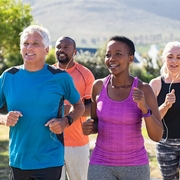Information you need to live a happy, worry-free retirement!
Originally published October 2, 2019, last updated October 3, 2019
Need Motivation to Exercise? Here Are 3 Great Reasons to Get Moving

You know you should do it. But exercising takes motivation.
So how do you get motivated to move?
The World Health Organization recommends that older adults spend 150 minutes doing moderate intensity aerobic exercise, and more and more studies point to exercise as the best medicine to help us age healthily. Here, we dug through some of the latest research, to find three motivators to get you moving.
Exercise to Fight Off Alzheimer’s Disease
New research shows that for people at risk of Alzheimer’s disease, working out a couple times a week might at least slow the onset of the disease. Researchers at the University of Texas Southwestern Medical Center in Dallas found that regular exercise over a year slowed the degeneration of the part of the brain tied to memory among people who had a buildup of amyloid beta protein in their brain.
There’s even more research to back this up. According to a Mayo Clinic study, any exercise that gets the heart pumping may reduce the risk of dementia and slow the condition’s progression once it starts.
Cardiovascular exercise that elevates your heart rate increases blood flow to the brain and body, reducing potential dementia risk factors such as high blood pressure, diabetes and high cholesterol.
Exercise to Live Longer
“There’s no question that exercise is the biggest anti-aging medicine there’s ever going to be — it’s really huge,” Gordon Lithgow, chief academic officer at the California-based Buck Institute for Research on Aging, told The Washington Post.
A study published in the Journal of the American Heart Association found that older people who spent less time sitting and more time moving had fewer signs of encroaching heart disease.
So, what type of activity can help you live a longer life?
Ahmed Elhakeem, the study's author and a professor of epidemiology at the University of Bristol, said in a statement, “It's important to replace time spent sedentary with any intensity level of activity."
Two forms of exercise are tied to antiaging benefits — aerobic exercise, which gets your heart pumping and sweat flowing, and strength training, which helps prevent aging muscles from weakening over time. A growing body of evidence shows that both can keep you healthy.
Exercise to Maintain Outdoor Mobility
As we age, our functional ability declines, changing the way we walk. These changes are called walking modifications and can include walking slower, pausing for rest or using a walking aid such as a cane or walker. People experiencing a decline in functional ability may limit or entirely stop walking long distances because it’s too hard or scary. But a new study conducted at the Faculty of Sport and Health Sciences, University of Jyväskylä, found that these walking modifications can facilitate older adults’ outdoor mobility.
Previous research on walking modifications implicitly has considered modifications in a negative way — as an early sign of functional decline. The new study aimed to find out if walking modifications could have a more positive, or enabling, outcome. While it found that using walking aids lowered walking speed, it also found that reduced frequency of walking and avoiding walking long distances were categorized as maladaptive modifications. Those who used “maladaptive modifications” had smaller life-space mobility and perceived they lacked possibilities for outdoor mobility. However, those who chose to utilize adaptive walking modifications maintained wider life-space mobility and were satisfied with their outdoor mobility opportunities.
“Encouraging older people to opt for adaptive walking modifications might be possible by designing age-friendly environments, for instance by providing opportunities to rest when walking outdoors. However this warrants further studies," said doctoral student Heidi Skantz.
So don’t view the changes in your walking due to age as a sign that you should stop walking. Go ahead and take a break when you need to. Or walk slower. As this study found, these modifications can allow you to cover long distance and maintain outdoor mobility.



